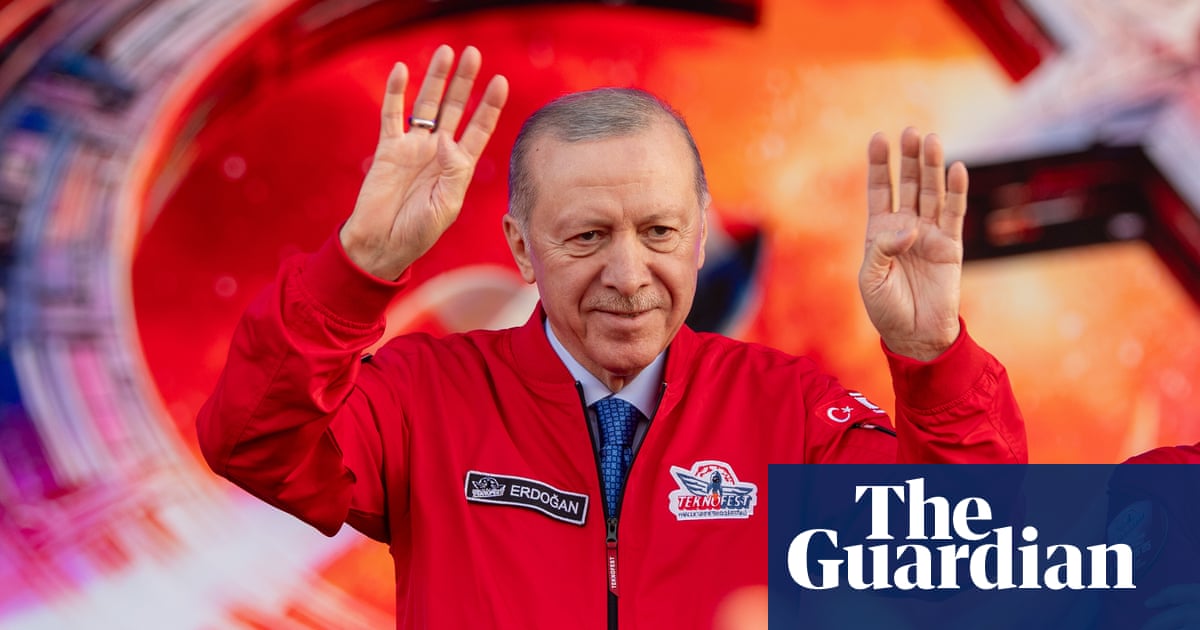Turkey’s president,Recep Tayyip Erdoğan, has warned protesters in breakaway northern Cyprus not “to sow seeds of hatred” amid mounting discord over Ankara’s perceived attempts to Islamise one of the world’s most secular Muslim societies.
In a whirlwind visit to the Turkish-occupied territory on Saturday the leader had tough words for Turkish Cypriots who have stepped up demonstrations against policies he openly endorses, not least a controversial law allowing headscarves to be worn in schools.
“Those who try to disrupt our brotherhood, to create a rift between us, and to sow the seeds of hatred … will not be successful,” he said as he inaugurated a new presidential residence and parliament in the self-styled state.
Later, as he addressed a technology festival, he went further, telling trade unions that opposed the measure: “If you try to mess with our girls’ headscarves in the Turkish republic of northernCyprus, I am sorry, you will find us against you.”
On Friday thousands of Turkish Cypriots took to the streets of Nicosia, thecountry’s war-split capital, chanting “hands off our land” as they denounced the legislation.
In a speech before a crowd metres away from Turkey’s embassy compound, Selma Eylem, who heads the Cyprus Turkish secondary education teachers’ trade union, said the regulation was tantamount to imposing political Islam on a society that not only prided itself on its secular identity but inherently secular way of life.
“We say, once again, to the representatives of the AKP [Erdoğan’s Islamist-rooted party]: Keep your hands off our children and keep your hands off our society.”
Erdoğan had hoped to use the trip to showcase Ankara’s continuing support for a community that it had in 1974 sought to rescue when Turkish troops were ordered to invade Cyprus, seizing its northern third.
The military operation had followed a rightwing, Athens-backed coup aimed at uniting the island with Greece. In the more than 50 years that have elapsed, the territory, which unilaterally declared independence in 1983, has been recognised by no other country but Turkey.
Ahead of his visit officials had said that Erdoğan’s focus would be on the opening of the big government complex, financed by Ankara with the aim of promoting international acceptance for the isolated entity.
On Saturday the Turkish president insisted that in the wake of decades of failed peace talks between Greek and Turkish Cypriots only “a two-state solution” could be discussed to resolve the west’s longest running diplomatic dispute.
“The two-state solution is the joint vision of Turkey and northern Cyprus,” he said. “Any new negotiation process must be between two sovereign states.”
Friday’s demonstration, which followed almost daily protests over the hijab law, was organised by more than 100 trade unions and civil societies many of which still advocate the island’s reunification as a bi-zonal, bi-communal federation.
“Partly because of Kemalism but also because of eighty-two years of British colonial rule, Turkish Cypriots are by far the most secular Muslims in the world,” said Hubert Faustmann, professor of history and political science at the University of Nicosia in the internationally recognised south.
For Turkish Cypriots who have long opposed Ankara’s ever-expanding influence in the north, the regulation, he said, was further proof of the leader’s determination to not only erode long-held secular traditions but ultimately alter their own identity.
“What we are witnessing is a cultural clash,” Faustmann said. “The legislation on headscarves is seen as part of a package of continuous attempts by Erdoğan to unwind the secular character of the community.”
With the backlash showing no sign of abating, Turkish Cypriots appear determined to have the measure repealed – even if it has been vigorously defended by the community’s leader, Ersin Tatar, a close Erdoğan ally who argues the law protects students from discrimination.
“If we are to save ourselves we have to continue this struggle,” said Şener Elcil, a veteran former trade unionist.
Increasingly, he lamented, Turkish Cypriots had been made to feel like a minority “in our own land” as a result of hundreds of thousands of mainland settlers moving to the north.
“Religion was never a point of division on this island but after years of building mosques that Turkish Cypriots don’t even go to, they want to make it one in our schools,” he added. “Now, more than ever, we need to stand up to Erdoğan and have our voices heard.”
